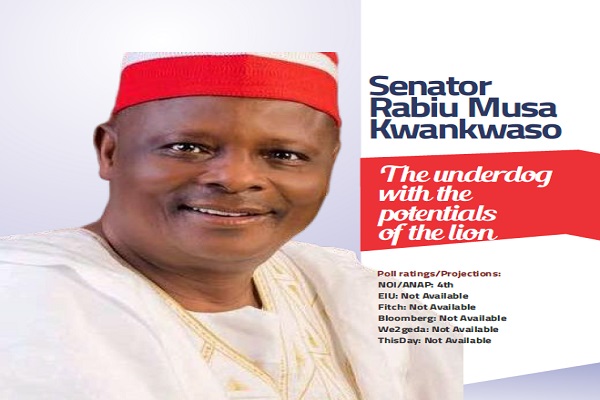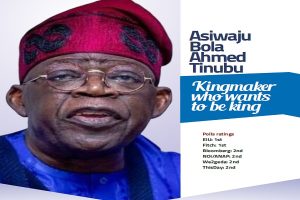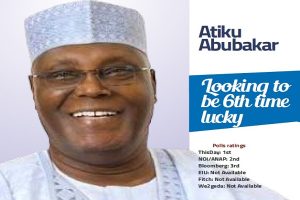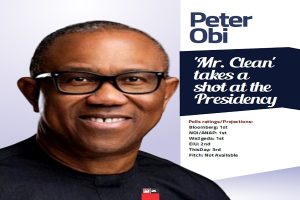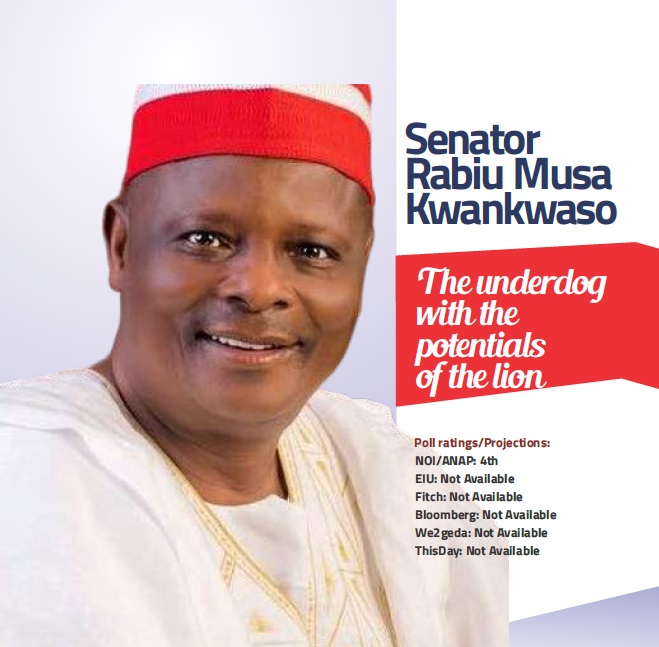
By his own count, Senator Rabiu Musa Kwankwaso, Presidential candidate of the New Nigeria People’s Party (NNPP), has spent 30 years on Nigeria’s political scene. This compares very favourably with any of his co-travellers on the 2023 Nigerian presidential train.
And, apart from Atiku Abubakar, the presidential candidate of the Peoples Democratic Party (PDP), none of the current front runners for election as the President of Nigeria has contested for the office more times than Kwankwaso. It is these experiences combined with his personal pedigree and other antecedents, perhaps, explain why the former two-time Governor of Kano state, former defence minister and Senator, has pushed his way up into reckoning as one of the leading contenders in Nigeria’s presidential election slated for February 25. Indeed, most pre-election opinion polls rate him the number four top contender.
Kwankwaso was the Governor of Kano state from 1999 to 2003 and 2011 to 2015. After he lost his re-election in 2003, he was appointed the first Minister of Defence of the Fourth Republic with no prior military background from 2003 to 2007, under the administration of former president Olusegun Obasanjo. He was later elected to the Senate in 2015, serving one term under the platform of the All Progressives Congress (APC) representing Kano Central Senatorial District.
He is currently the national leader of the New Nigeria Peoples Party. Kwankwaso enjoys widespread support in Kano and north-western Nigeria; he has been viewed as a charismatic populist. In 2011, he was re-elected Governor of the state and went on to join APC in 2014 and, in 2015, unsuccessfully contested the presidential primaries nomination under the party but lost to Muhammad Buhari. In 2018, he returned to Peoples Democratic Party (PDP) and contested the presidential primaries losing out to Atiku Abubakar.
Personal accomplishments
Rabiu Musa Kwankwaso was born on 21 October 1956 in Kano, to a Sunni Fulani Family of the Genawa Fulani Clan. His father held the position of the village head of Kwankwaso with the title of Sarkin Fulani Dagacin Kwankwaso before being elevated to the position of the District Head of Madobi with the title of Majidadin Kano, Hakimin Madobi.
He attended Kwankwaso Primary School, Gwarzo Boarding Senior Primary School, Wudil Craft School and Kano Technical College before proceeding to Kaduna Polytechnic where he did both his National Diploma, and Higher National Diploma. Kwankwaso was an active student leader during his school days and was an elected official of the Kano State Students Association. He also did his postgraduate studies in the United Kingdom from 1982 to 1983 at the Middlesex Polytechnic; and Loughborough University of Technology where he received a master’s degree in water engineering in 1985. He also bagged his PhD in Water Engineering at Sharda University India, in 2022.
Kwankwaso joined the Kano State Water Resources and Engineering Construction Agency in 1975. He served there for seventeen years in various capacities and rose through the ranks to become the Principal Water Engineer.
Governmental/political antecedents
Kwankwaso made his entry into politics in 1992 on the platform of the Social Democratic Party (SDP).

The same year, Kwankwaso was elected as a member of the House of Representatives representing Madobi Federal Constituency. His subsequent election as Deputy Speaker in the House brought him to the limelight of national politics. During the 1995 Constitutional Conference, Kwankwaso was elected as one of the delegates from Kano, as a member of the People’s Democratic Movement led by Yar’adua. He later joined the Democratic Party of Nigeria (DPN) in the political transition program of General Sani Abacha.
Kwankwaso joined the PDP in 1998 under the platform of People’s Democratic Movement in Kano led by Mallam Musa Gwadabe, Senator Hamisu Musa and Alhaji Abdullahi Aliyu Sumaila. In 1999, he contested the PDP primaries alongside Abdullahi Umar Ganduje, Mukthari Zimit, Alhaji Kabiru Rabiu. The Santsi/P.S.P were behind the candidature of Abdullahi Umar Ganduje but they lost to Kwankwaso in the primaries.
Kwankwaso was elected and served his first term as the Governor of Kano State from May 29, 1999 to May 29, 2003. His first tenure as the Governor of Kano State was very eventful because of several other groups who were opposed to his high-handed governorship and his attempt at supporting Yoruba President Olusegun Obasanjo. In 2003, he lost re-election to his rival Malam Ibrahim Shekarau.
Kwankwaso was re-elected as Governor of Kano State for the second time from May 29, 2011 to May 29, 2015. During this time, he set out to rejig the political structure of Kwankwassiya: building roads, hospitals and schools and sending residents to study abroad. In August 2013, Kwankwaso was amongst seven serving Governors who formed the G-7 faction within the PDP. In November 2013, Kwankwaso, alongside five members of the G-7, defected to the new opposition party, APC.
In October 2014, Kwankwaso used his large political following in Kano to contest the APC presidential primaries held in Lagos with the results: Muhammadu Buhari, 3,430; votes, Kwankwaso, 974; Atiku Abubakar, 954; Rochas Okorocha, 400; and Sam Nda-Isiah, 10 votes. Coming in second, Kwankwaso endorsed the winner Muhammadu Buhari.
Earlier, from 2003 to 2007, Kwankwaso was appointed as Minister of Defence in President Olusegun Obasanjo’s second cabinet, replacing General Theophilus Danjuma.
In 2007, Kwankwaso resigned his ministerial position to contest the Kano State governorship election but he lost because he had been indicted by a Government White Paper. Alhaji Ahmed Garba Bichi later replaced him as the governorship candidate of the party. After losing the bid from his party to contest the 2007 elections, he was appointed as the Special Envoy to Somalia and Darfur by President Olusegun Obasanjo; and was later appointed by President Umaru Yar’Adua as a Board Member of the Niger Delta Development Commission, a position he resigned from in 2010.
Kwankwaso represented Kano Central Senatorial District at the Senate of Nigeria for one term from May 2015 to May 2019.
In July 2018, Kwankwaso alongside fourteen serving senators of the APC defected to PDP and in October 2018, he contested the PDP presidential primaries. At the presidential primaries held in Rivers state, amongst twelve presidential aspirants, Kwankwaso came in fourth behind Atiku Abubakar with 1,532 votes, Aminu Tambuwal with 693 votes, Bukola Saraki with 317 votes and Kwankwaso with 158 votes. Kwankwaso later endorsed the winner, Atiku Abubakar, and refused to seek re-election into the senate, with Ibrahim Shekarau replacing him. Kwankwaso campaigned heavily for his son-in-law, Abba Kabir Yusuf, to emerge as the Governor in Kano State. The election was later declared inconclusive with the incumbent, Abdullahi Umar Ganduje, winning after the rerun.
On February 22, 2022, Kwankwaso set up the National Movement as a political movement against the staying power of the two major political parties, APC and PDP. He co-opted the New Nigeria Peoples Party as the political wing of the movement and became the national leader of the party on March 30, 2022.
Kwankwaso’s time in office produced a number of notable achievements. During his first tenure in office as Governor (1999 to 2003), he established the Kano University of Science and Technology in Wudil, the first and only state university in Kano at the time. During his second tenure (2011 to 2015), Kwankwaso established the North West University, Kano, the second state University in Kano. He also established 26 academic and manpower development training institutes and through these institutes over 360,000 youth and women were trained and empowered. He was the first Governor in Nigeria to introduce free school feeding and uniforms for primary school pupils. This exponentially increased the school enrolment figures from 1 million in 2011 to over 3 million in 2015 when he left office.
His passion for education saw to the introduction of free education at all levels in the state and saw to the adequate provision of teaching and learning materials. He established 230 secondary schools of which there are 47 technical colleges, 44 schools of Islamic studies, a Chinese college, a French college, and the first boarding girls’ college as well as a boys’ college in Damagaran and Niamey jointly with the Government of Niger Republic. In his four years as the Governor of Kano State, he awarded over 2,600 postgraduate and undergraduate foreign scholarships in 14 countries across the world. This is in addition to the local private university scholarship in Nigeria.
In the area of infrastructure, for the first time in the history of Northern Nigeria, three flyover bridges were constructed, 5 km dual-carriage lighted roads were being constructed in each of the 44 Local Government Areas of Kano, and two underpass bridges were constructed. Kwankwaso also initiated the covering of drainages with interlocking tiles in the state, including the covering of the Jakara River which cuts across the city of Kano with a dualised road, which greatly improved the environmental and sanitary condition of the entire city of Kano. Kwankwaso also built many houses and estates in both his first and second tenure in office. Three modern cities, Kwankwasiyya, Amana and Bandirawo were built with about 3,000 housing units of various capacities put up for sale to the general public. About 1,500 houses were constructed and donated free to rural poor communities and victims of flood disasters.
After leaving office as Governor, Kwankwaso launched the Kwankwasiyya Development Foundation (KDF), an initiative designed to help the people of Kano state and across Nigeria. Through the foundation, Kwankwaso supported many young people to further their education with continued financial assistance. The first batch of 370 beneficiaries of the foundation’s overseas scholarship returned to Nigeria in 2021 after successfully completing their degrees. Upon completion of their studies, many of the scholars secured jobs with various national and international organisations such as Dangote and Bua, which was facilitated through the Kwankwasiyya Development Foundation.
Through the KDF, Kwankwaso also secured the release of 170 inmates in various prisons across Nigeria by paying their fines and providing transport to enable them get to their destinations and reunite with their families. Kwankwaso has also donated sports kits and cash worth over 150 million naira to amateur football clubs across states in Nigeria. This is part of his effort to support the growth and development of local sports in Nigeria, an area that provides young people with opportunities across the globe. The foundation also donated cash and food items to the poor and needy, including widows, people with disabilities, and orphans, in an effort to alleviate poverty, especially among women in Nigeria.
On his 64th birthday in 2020, Kwankwaso inaugurated a 300-pupil capacity school which he built in Rano Local Government Area. The school is solar-powered and has a block housing six classrooms. The school was built through KDF in line with Kwankwaso’s vision and mission to support education.
Credibility/integrity
Like many Nigerian politicians that have played at the level and for the time span that he did, Kwankwaso has not been able to escape corruption allegations and indictments.
For instance, a six-member commission of inquiry which was headed by Hon. Justice Ahmed Badamasi as chairman to inquire into the activities of Kwankwaso found him culpable. A white paper on the report issued by the government in November 2004 indicted Kwankwaso.
Also, at the end of his second tenure as Governor in 2015, Kwankwaso was investigated by the Economic and Financial Crimes Commission (EFCC) over alleged misappropriation of N10 billion pensions funds.
However, later in 2016, EFCC denied and refuted claims of any pending corruption case and prosecution against Kwankwaso. He strongly denied and rejected any corruption allegations against him, describing it as mere political blackmail, mischievous and sponsored by his enemies and political rivals to tarnish his image and reputation.
National outlook
Kwankwaso took his politics outside his Kano base as far back as the early 1990s.
In 1992, he was a member of the People’s Front faction of the SDP, led by General Shehu Yar’adua. His association with Yar’Adua who was then a Presidential contender gave Kwankwaso a headstart in cross-country politics as it brought him into contact with other popular politicians such as his former boss Senator Magaji Abdullahi, Babagana Kingibe, Atiku Abubakar, Bola Tinubu, Tony Anenih, Chuba Okadigbo, Abdullahi Aliyu Sumaila, Abubakar Koko and Lamidi Adedibu, amongst others.
His election as a member of the House of Representatives representing Madobi Federal Constituency the same year marked his formal arrival at the national political stage. His stay at the Federal Capital was further cemented when he was subsequently elected as Deputy Speaker in the House. During the 1995 Constitutional Conference, Kwankwaso was elected as one of the delegates from Kano, as a member of the People’s Democratic Movement led by Yar’adua. For him, there was no going back as a national political player as he, at various times subsequently, became a senator, a minister and presidential aspirant. All these helped him to build contacts and structures nationwide on which he is now seeking to climb to the ultimate political position in the country – the presidency.
However, in spite of his large national political stature, Kwankwaso is running on the platform of a party, NNPP, that is relatively unknown in many parts of the country. This has given him the image of a presidential candidate that can boast of winning only in his home state. But the significance of that image is massive when that one state is Kano, the state whose voter population is the highest in the country. As a matter of fact, in recent presidential elections, Kano was able to deliver votes larger than those of many states put together. Thus, if Kwankwaso, the “home boy” is able to snap the Kano state votes, some from neighbouring northwestern states and springs surprises elsewhere, who knows.
It is apparently on the basis of this calculation that many polls and projections tag him along with Tinubu, Atiku and Obi and placing him at the rear of the Top Four. In fact, in the February 25 Presidential election, Kwankwaso is like the underdog with the potentials of a lion.

